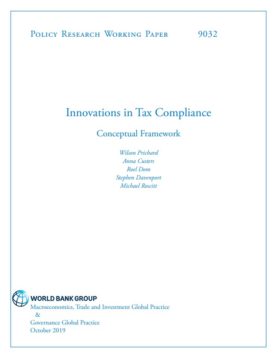Policy Research Working Paper 9032
This paper presents a conceptual framework for developing more effective approaches to tax reform and compliance. The framework proposes that by combining complementary investments in enforcement, facilitation, and trust, reformers can not only strengthen enforced compliance but can also (a) encourage quasi-voluntary compliance, (b) generate sustainable political support for reform, and (c) create conditions that are more conducive to the construction of stronger fiscal contracts. A key challenge for governments lies in finding the right combination of these three measures—enforcement, facilitation, and trust— to achieve revenue and broader development goals. The framework proposes greater reliance on locally grounded binding constraints analysis, coupled with careful attention to understanding politics and the drivers of trust in particular contexts, to guide analysis of how best different investments may be combined, prioritized, or sequenced. This framework can help policy makers to think about the right combination of strategies in specific contexts, and thus to allocate resources most effectively
